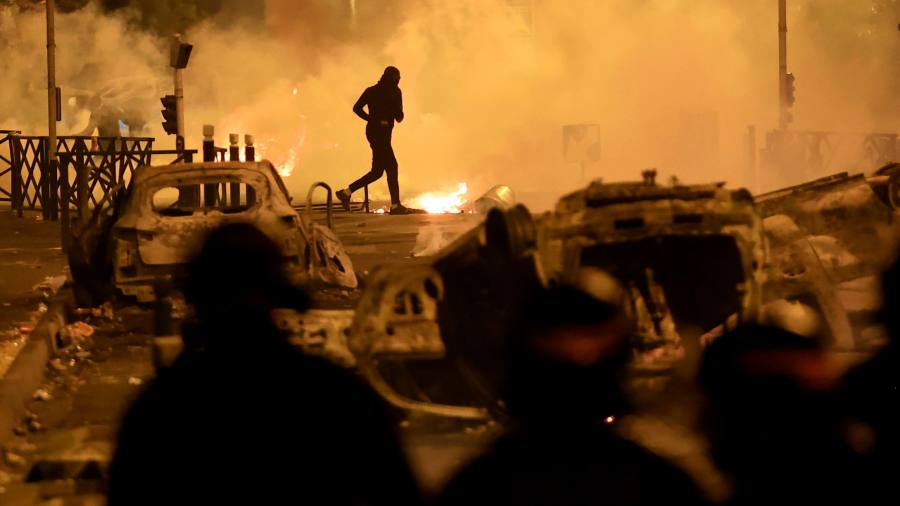Receive free French politics updates
We’ll send you a myFT Daily Digest email rounding up the latest French politics news every morning.
The writer is a former UK prime minister
The Paris I just returned from is calm again. The streets are busy, the tourists doing their thing, the Parisians behaving typically. There have been worries that next year’s Olympics could be affected by the riots of the past 10 days. But in 2011, London had serious unrest. In 2012, we held one of the most successful Olympics ever. Paris 2024 will, no doubt, be a magnificent spectacle.
However, the memory of nights of rioting and destruction, following the tragic killing of the 17-year-old boy from Nanterre by a police officer, will leave its mark and has naturally provoked soul-searching in France. The truth is that such an event, and the outburst of rage and criminality that erupted, could happen virtually anywhere in a modern western developed country. It speaks to deep-seated problems with a section of society that defies conventional policymaking.
There is a familiar pattern: parts of a big city where there are marginalised groups of citizens, with young people particularly alienated. A culture passed from generation to generation, in which drugs and gangs are rife, unemployment high, at least in the formal economy, educational attainment poor and, usually, a fractious relationship between the community and law enforcement.
An event occurs involving the police, and the tinder is lit. What begins as protest morphs quickly into an ugly riot of looting, pillage and crime. The political response is then also extraordinarily predictable. The right blames the absence of tough penalties, the criminal justice system (and, more insidiously, immigration), while the left blames social conditions. The right speaks for the majority of the public who detest the violence — but will persuade none of those perpetrating it. The left is caught in a bind between sympathy for the alienated and excusing what the majority find inexcusable.
Both have a point but none of their strategies seem to have worked. In the middle is President Emmanuel Macron in the most unwinnable of situations. The killing should not have happened. That’s clear. The violence should not have been the response. Also clear. But when he says the first, it appears he’s not supportive of the police; when he says the second, it looks as if he’s impervious to the roots of the riot.
Studying the record, it is wrong to say the issue has been neglected. On the contrary, his government has invested in the poorest parts of the inner cities and towns, programmes for families, for sport, for youth recreation and billions in regeneration projects.
And France itself has become highly successful in attracting investment, has built a burgeoning start-up tech sector and is making reforms, like the pension reform, which, though controversial, are considered by most outside observers to be both necessary and overdue. No one reforming systems with entrenched interests is ever popular in the short term, and Macron is no exception. The nearest I came to losing a big vote and therefore potentially my premiership came over university tuition fees, not foreign policy.
But this reality doesn’t touch those quartiers where the culture is operating on a different planet from that of the tech entrepreneur. So what does work?
First, it is true that without order, there is no hope. So you cannot allow criminality to outpace law enforcement. There can be no “no go” areas for police. They need authority and backing. If necessary, special courts are required to deal with offenders and deal with them fast. In the UK, the failure of the present system to do this will be a nightmare in the future unless corrected.
Second, it is also true that the underlying social conditions giving rise to this culture of alienation must be confronted. The programmes offering help aren’t a waste of money. There will be young people who benefit from them. But they need to be conceived and implemented with the communities affected, so that it is plain that the money flowing in is part of a deal. The state must shoulder its responsibilities but the communities have responsibilities, too. It is up to government and local leaders to make this a two-way accord.
Third, never underestimate the importance of education. In London, in the poorest boroughs the number of children getting good GCSE results in 1997 was about 25 to 30 per cent. That was a staggering failure rate. Very few went to university. The London Schools Challenge Programme made substantial reforms to education over a decade. By 2010, the figures had moved to more than 75 per cent passing GCSEs with about half of students going to higher education. Education is the best answer to alienation.
Fourth is the targeting of what we might call “troubled” families, who tend to be known in the community and who often cause a massive proportion of the criminality. And experience shows conventional programmes aimed simply at fixing “poverty” don’t work. They need a mix of pressure and support. And zero acceptance that their present situation is tolerable.
Macron is an outstanding leader. Defaulting back to populism on either the left or the right is not the answer for France or any other western nation. What is needed is specific policy based on a comprehensive analysis of the problem.
And one other lesson. It takes time. A decade at least.
Read the full article here




